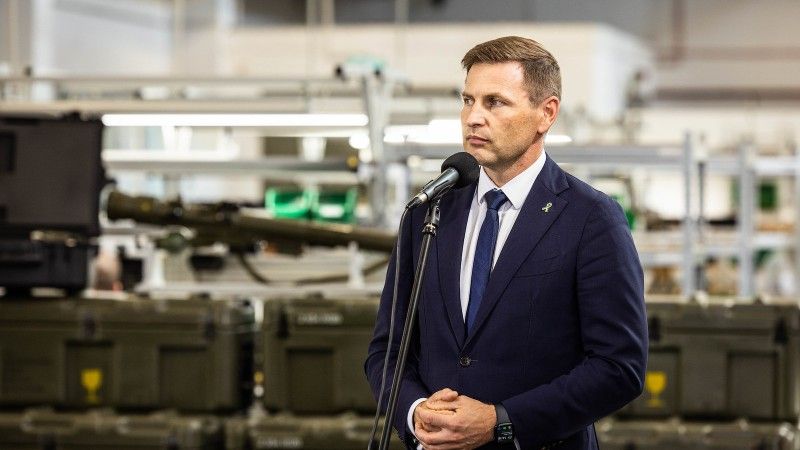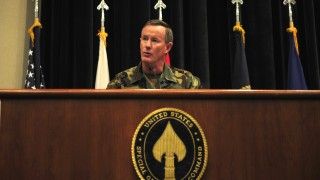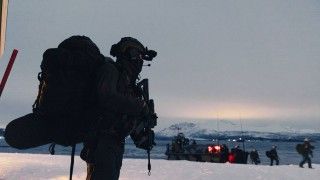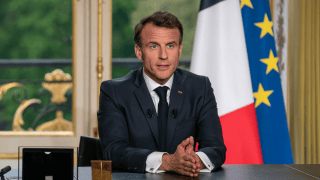- WAŻNE
- WIADOMOŚCI
- WYWIADY
"Piorun has proved to be the best option." Estonia's defence minister says about cooperation with Poland [INTERVIEW]
“From our perspective, it was about buying the best quality at the best price and as soon as possible. Piorun turned out to be the best option, also because the Polish Army ordered Piorun missiles at the same time ” - says Defense Minister of Estonia Hanno Pevkur in an interview with Defence24.pl editor Juliusz Sabak. The Estonian minister also emphasizes the importance of allied cooperation, the state’s ability to defend itself independently and support Ukraine.

Photo. Kaitseministeerium
Juliusz Sabak, Defence24.pl editor: I'd like to start with an unconventional question. Last year, during Warsaw Security Forum, I spoke to your predecessor, Estonian Minister of Defence Kalle Laanet. Like you, he had been the Minister of the Interior. Is it a tradition of some kind?
Hanno Pevkur, Head of the Estonian MoD: This is not a tradition, but it shows that Estonia has always taken a comprehensive stance towards defence. Defence and security are related to actions taken by all of the Ministries. Of course, mostly to the Ministry of Defence and the Ministry of the Interior.
Is your previous experience as the Minister of the Interior helpful when working as the Minister of Defence?
Of course. Both functions have a lot in common. Many areas of activity between these two ministries overlap and are shared. But we try to avoid redundancy. As the Navy and our Border Guard serve a similar purpose, we've decided to bring their vessels together into a single fleet.
For many years now, probably ever since you've become independent, you have been exposed to strong pressure inflicted by Russia. Are the Estonians concerned about Russia? Neighbour is also a large, and in fact, aggressive state.
We have never been concerned about Russia. We are not afraid of it now and never will be. The Estonians have always been very much self-aware. We knew what we want, what state we want to create, and how that state should be developed.
Currently, we are intensely engaged in boosting our defence capabilities. This year we have decided to spend an extra EUR 1.2 bn. That means that next year, our defence expenditure will exceed 2.8% of GDP to reach more than 3.1% of GDP in 2024. As we can see, I am planning major investments.
And what is the Estonian citizens' view of that increase in defence spending?
The Estonians - both the citizens and the politicians - support decisions as such. This is a thing we should be doing together. No fight between the political parties shall be present within that scope. This is, obviously, a lot of money, but let's be honest, one cannot put a price tag on freedom. This is the truth that we need to keep in the back of our heads thinking about defence expenditure.
Is there a certain consensual agreement here, also among the politicians? I would imagine that with the current crisis, inflation, and economic problems, some people may come up with an idea to redirect the defence funds to some "more urgent" matters.
What could be more urgent these days? When you have no freedom or even no country, where is the sense of investing in social welfare or culture? Without freedom, we would have no culture of our own. The language and the physical existence of the nation would be under threat. Security is the only thing that guarantees that you will be able to make decisions concerning your culture and society. I see no other way out. As the saying goes, si vis Pacem, para Bellum.
From what you have told me, we can see a high level of self-awareness among the Estonians. This is a part of your and our experience as well. The history...
Not just the history. This is a part of our military system. Part of education... We know that to adopt an open stance towards defence, we need to make everyone aware and clarify what to do during a crisis. Not just the soldiers at the front line. Everyone can help through one's cybersecurity, social, or medical experience. During a war, all resources and capabilities that remain at disposal of the state and its citizens should be put to proper use.
The Reserve army is a unique thing about Estonia and Finland. We have a compulsory military service system put into place, and after finishing that service, everyone becomes a part of the reserves, regularly taking part in exercises. Regular and surprise, unplanned exercises as well. This gives us a certainty that people who are to defend our country are properly prepared to do that.

This is one of the key differences between Estonia and most of the NATO member states. Many people are involved in the Armed Forces, and the Army has not become a separate, parallel world for society. It is an inseparable part of that society.
Yes, I think this statement describes well what we have in our country. We have professional soldiers for whom the Armed Forces are their daily life. This is their job and obligation. But we also have many reservists.
We arranged a surprise exercise a few weeks back without any advance information released. This was done to check the readiness, also in the governmental and administrative domains. How quick are we able to make political decisions? How quick can we assemble and deploy the military units in the field? We have checked that, and I can say that we are very satisfied with the result. But this is what the exercises are for. It's not about satisfaction, it's about readiness to face a myriad of unexpected situations.
We will continue to train. Get ready. But at the same time, this is a clear signal to our citizens: Yes, we are ready! We are ready to face any type of threat.
Moving on, but still discussing the preparatory steps. Observing your recent expenditure, it is clear you are making major investments in anti-tank weapons, artillery, or air defences.
Yes, we are investing a lot in security, but we are doing this together with the allies. For instance, we have procured the Piorun VSHORAD MANPADS together with Poland. We signed an agreement just a few weeks back with Minister Błaszczak. We have a contract regarding the Blue Spear 5G anti-ship missiles, with a range of 250 kilometres. We are procuring HIMARS systems jointly with Latvia. With Latvia also, we are acquiring medium-range air defence systems. The first bids are expected to be submitted in a few weeks. We are buying numerous anti-tank systems, like Spike, Instalaza, and mines.
We are expanding, in fact, doubling the size of our Territorial Defence component. That means we need to procure the necessary equipment and weapons for them. We are hence making large investments in security. But we are also interested in NATO continuing the processes initiated during the summit in Madrid. We agree to extra infrastructure being established in Estonia. The British are to deploy an additional brigade to our country. We also expect the next NATO Summit in Vilnius to become an opportunity to have new plans for the region approved. For the NATO Eastern Flank. Yes, we do a lot ourselves, but we are also working together with our allies.
You must be happy about Sweden, and Finland in particular, joining NATO?
Of course, we are happy about the fact that Sweden and Finland will soon become a part of NATO. Both are valuable allies. Especially when it comes to the Baltic Sea. We have seen what happened to the Nord Stream. In my view, all of the Baltic States shall treat this very seriously. We must take care of the security of our pipelines, but also undersea cables at the bottom of the Baltic Sea. Here we can do a lot - jointly with Sweden and Finland, but also with Poland.
You are emphasizing deterrence - seeing the weapons you procure, and hearing your statements on cooperation with the allies. This is a very good strategy for a small country like Estonia.
Deterrence is very important. Deterrence involves one's own potential. On the other hand, we know we need our allies. But our allies need to know that we can defend ourselves. That we want to defend ourselves. This is what we are doing right now. We are making investments to be able to defend ourselves on our own.
One should also stress the fact that our decisions, and our spending, are partially motivated by what is happening in Ukraine. The war is waging there right now. It is my obligation to send a clear signal to our society that we draw knowledge from and base our decision-making on the Ukrainian experience. This is the place where we gain understanding of how the Russians operate and what they are capable of.
You are learning, but you are also helping Ukraine. I can say that your support has been much more significant than the support provided by many larger, stronger countries. You are sending in a lot of weapons, ammunition, or even UAVs.
Yes, we are helping them, and we will still do that. We all understand that it is the right time to do it. It is necessary to accelerate deliveries from all of our nations. The Baltic States, Poland, Czech Republic, Slovakia - we all are very much involved in helping Ukraine. Obviously, I really appreciate what Poland has been doing in these tough times now.
We all need to understand: it's not about fighting for Estonia, Poland, or even Ukraine. We are fighting for a free, democratic world. We are all, together, fighting for a world based on law and order. We are facing an aggressor for whom national borders and independence of the nations are both meaningless. An aggressor who does not respect international law.
I think that we share awareness with Poland - this is not Russia fighting a war just against Ukraine, as it is a war targeting the democratic world as a whole. This is a thing that brings together states that experienced Moscow's occupation and power. This is a matter that is not fully understood by the states west of us, or they are gradually starting to comprehend it.
This is why we need to promote our agenda on the forum of organizations like the EU, NATO, and UN. With knowledge and experience of the Russian modus operandi, behaviour, and with arguments why this should be opposed. This needs to be talked about.
I would like to go back to the matter tied to cooperation with the allies and neighbours. Hearing you, one may conclude that the Estonian perspective is broader, and steps beyond the protection of own borders and citizens.
Of course. When I look at Estonia, Latvia, Lithuania, or even Poland - relatively big, with large Armed Forces and then look at what is happening in Ukraine, we can clearly see what the scale of the threat is. We also see that this is the reason why NATO has been brought to life. To jointly protect the territories of our states. Not just every inch of Estonia, but also every inch of NATO territory. This is what the Article 5 is all about.
Our liability is to show all alliance members that Estonia, Lithuania, Latvia, and Poland are the pioneers here. The same applies to Slovakia, Hungary, and nations further down south. We are the front door, the NATO frontline. If we are not protected, then NATO as a whole would not be protected.
This is clear to Luxembourg's Defence Minister with whom I spoke today. For him, it is clear that if the Eastern Flank is not safe, then Luxembourg is also unsafe.
You see the Eastern Flank as a door to NATO's?
Yes. It is not a flank. It is a front door. If that doorway is open, all other doors will remain open as well. Using that metaphor, the front door is usually fitted with locks and well protected, much better than what's inside the house. In NATO it's similar. The locks are just in the front, exterior door. We should always have them tight closed.

Photo. Kaitseministeerium
Coming back to the beginning of our talk, or, in essence, to the events that happened in early September. Why is that Estonia decided to procure the Polish Piorun MANPADS? You had a lot to choose from. Estonia already operates several MANPADS types.
Yes, we have other systems in Estonia, indeed. Stingers, for instance. But it was not about what we have now. It was about a choice for the future. Personally, I consider Poland to be a powerful, important ally. I think that our cooperation in the area of defence policy, and the defence industry, should be expanded.
From our perspective, it was about getting the best quality at the best price as fast as possible. So, three factors were at play: best price, quality, and time. Piorun turned out to be the best option also because the Polish Armed Forces procured the Piorun missiles at the same time. It was very important for us to become a part of this large order. Both parties would receive what they need at a reduced price.
I see this as a part of a coherent philosophy or strategy. You are buying different weapons systems, with Latvia, now with Poland. Do you see any areas where the Polish and Estonian defence industries could work together? I know that Estonia has its cybersecurity or UGV industry well developed.
Indeed, our businesses have had specific successes here. For the Estonian industry, this is a very attractive prospect. Not just because Poland has been making major defence investments recently. Also, from the point of view of R&D., Our approach is simple: we need the best options delivered across the shortest possible timeline. Thus, it is better to work together, to diminish the delivery time and get a better price, thanks to the scale of the procurement, as it happens in the case of the Piorun MANPADS. The more you buy, the better the price is. This applies to any sector, also the defence industry.
What are the plans for the future? The next big procurement is a medium-range air defence system, isn't that right? What is the situation here?
Of course, we already know the options we have. For now, we are considering around five possible bidders. These options are well known: companies from Israel, Germany, Norwegians with the Americans, and the Brits. These are the medium-range air defence system bidders we have.
When do you plan to conclude the contract?
As soon as possible. The decision has already been made by the government, and the funds have been allocated. The procurement was launched in August. I expect the first bids to be submitted in no more than 2 weeks. And then we would start to wonder with whom we would continue the negotiation.
And what are the following contracts that you have planned?
As Poland, we will also acquire the K9 from South Korea. Next, new wheeled howitzers would probably come. We will see.
We have quite a clear planning system in Estonia. Ten years plan for a broader perspective. 4-years planning cycles for specific procurements. We know what we want, when we want it, and how we want to get that.
How much did you have to change those plans with the war breaking out in Ukraine? Were the changes significant?
Of course, we did the Ukrainian homework and took that into account. Hence the decision to procure not just the K9s, but wheeled howitzers as well. The new war, whatever it is going to be, would also entail a new approach. The Russian "blitzkrieg" has not been successful. The Russians have gone back to old methods dating back to the times of WWII, with heavy artillery and shelling. We need to take that into the account and modify our defence capabilities.
Looking at the Ukrainian experience, we can clearly see the key role of intelligence and information. Rapid and efficient reconnaissance, and then the intelligence is quickly fed down the command chain. Do you consider any acquisition of systems that would enhance your situational awareness?
Early warning and expecting the enemy's next move remain important in a defensive effort. On the other hand, we need to understand that there is one very serious problem here - we cannot look into Putin's mind. There are no democratic decision-making processes in Russia. Putin does not need to worry about reelection. We need to understand that there may be very little time to react.
Thus, we need to gather information and make predictions, but constant readiness has also become very important. This is why NATO shall speed up its decision-making processes and shorten the time required to get the Quick Response Force ready.
So, in your view, we should always be ready to face unexpected action in the East, while NATO needs to learn how to react swiftly and firmly.
Home should always be ready to welcome unexpected guests. We never know when someone may ring a bell at one's door. Estonia, and other neighbors of Russia - we always need to be ready. The door should always be locked and secured.
I think this is a very good concluding note for our conversation.
Thank you very much.















